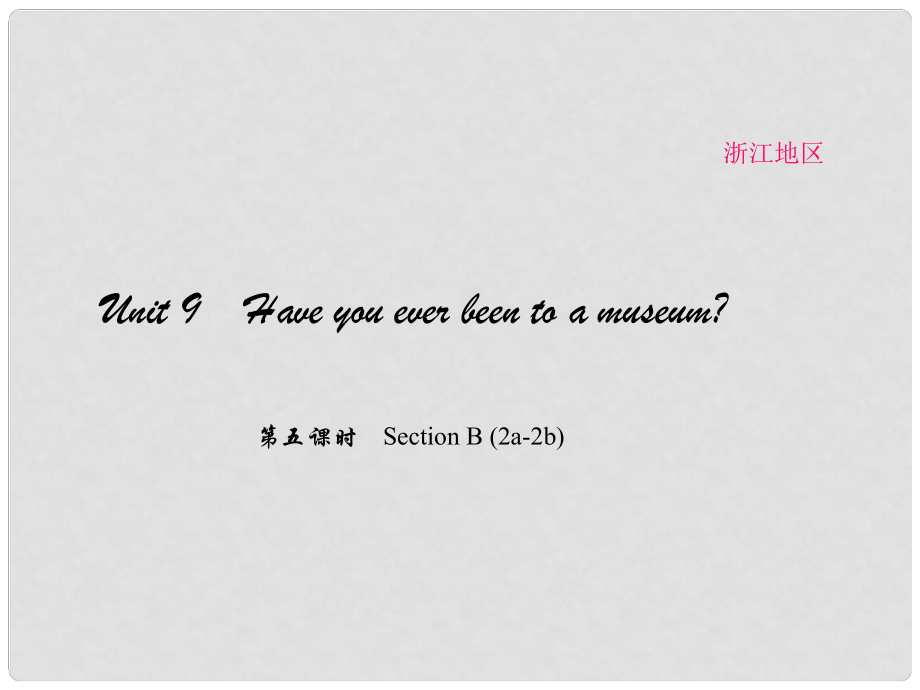《原(浙江專用)八年級英語下冊 Unit 9 Have you ever been to a museum(第5課時)Section B(2a2b)課件 (新版)人教新目標版》由會員分享����,可在線閱讀,更多相關(guān)《原(浙江專用)八年級英語下冊 Unit 9 Have you ever been to a museum(第5課時)Section B(2a2b)課件 (新版)人教新目標版(11頁珍藏版)》請在裝配圖網(wǎng)上搜索����。
1、Unit 9Have you ever been to a museum?浙江地區(qū)第五課時Section B (2a2b)on the one hand.on the other hand一方面另一方面����。hand與不同的詞搭配表示不同的含義,如:give sb. a hand給予某人幫助;hand in交上����,上交;hand out分發(fā)����。three quarters四分之三,英語中分數(shù)的表達法為:分子是基數(shù)詞����,分母是序數(shù)詞,如果分子大于1時分母要用復(fù)數(shù)����。“四分之一”可以說成a quarter����,“1/2”用a half。分數(shù)與名詞搭配時����,之間常用介詞of,即“分數(shù)of名詞”這一結(jié)構(gòu)����,作主語時����,謂語
2����、動詞的單復(fù)數(shù)視其后面的名詞而定����,如果名詞是復(fù)數(shù),謂語動詞用復(fù)數(shù)形式����;如果名詞是單數(shù)或不可數(shù)名詞,謂語動詞用單數(shù)形式����。fear及物動詞,意為“害怕����;擔心”,后接名詞����、動名詞����、動詞不定式或從句作賓語����。后接動名詞表示習慣性的動作;后接動詞不定式表示某次具體的動作����。eg:The shy girl fears looking up at others.這個害羞的女孩害怕抬頭看別人。whether在這里是連詞����,意為“不管,無論”����,用以引入選擇的可能性,引導(dǎo)的句子通常作狀語����。whether.or.意為“不管還是”,引導(dǎo)讓步狀語從句����。eg:Whether you like it or not����,youll ha
3����、ve to do it.不管你是否喜歡����,你將必須做這件事。 一����、根據(jù)句意及漢語提示完成單詞。1I will never spend a (千) dollars on a mobile phone.2Its not (安全的) to park your car here.3I (害怕) that he will refuse us.4 (是否) we can go for a picnic tomorrow depends on the weather.5 (春季) is my favorite season.thousandsafefearWhetherSpring二����、根據(jù)句意,用括號中所給單
4����、詞的適當形式填空。6I am (simple) a common student.7Ive never tried any (India) food.8Mr. Green knows a lot about (Japan) culture.9 (fox) eat smaller animals.10When is the best time (visit) Singapore?simplyIndianJapaneseFoxesto visit三����、根據(jù)漢語意思完成下列句子����。11你去過鹽城科技博物館多少次了����? have you Yancheng Science and Technology Mus
5、eum?12三亞是一個度假的好地方����。Sanya is a good place to 13在白天,他和其他工人一起搬運石頭����。 he carried rocks with the other workers.How many timesbeen totake a holidayDuring the daytime14在我們學(xué)校圖書館里有好幾千本書。There are in our school library.15一方面你要努力學(xué)習����,另一方面你要多鍛煉身體保持健康。 ����,you should study hard,and , you should exercise more to keep hea
6����、lthy.16Three fourths of the students are interested in English.(改為同義句) of the students are interested in English.thousands of booksOn the one handon the other handThree quarters四����、句型轉(zhuǎn)換����。17Jack has studied French for one year.(改為一般疑問句) Jack French for one year?18Her parents have been to Chongqing(對畫線部分提問) her parents ?19Frank has never been to the water park,and I have never been there����,either.(改為同義句)Frank has never been to the water park. I.20I have already passed the exam.(改為否定句)I the exam HasstudiedWhere havebeenNeither havehavent passedyet
 原(浙江專用)八年級英語下冊 Unit 9 Have you ever been to a museum(第5課時)Section B(2a2b)課件 (新版)人教新目標版
原(浙江專用)八年級英語下冊 Unit 9 Have you ever been to a museum(第5課時)Section B(2a2b)課件 (新版)人教新目標版

